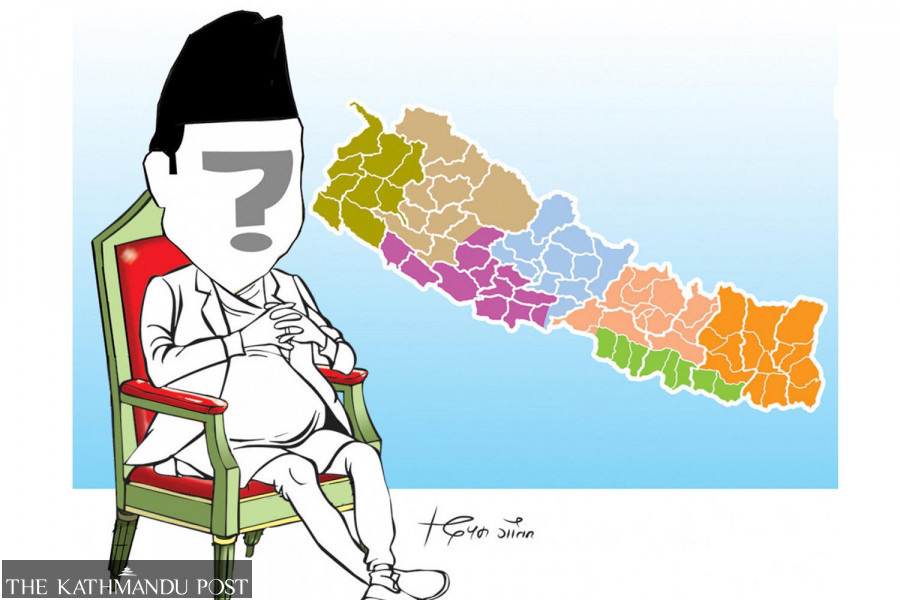National
Six months after elections, provincial governments are still incomplete
Experts warn prolonged delays will gravely undercut the spirit of federalism.
Nishan Khatiwada
Six months following the last major polls, the provincial governments are yet to get a full shape.
In Lumbini, two ministers without portfolios have yet to be assigned ministries. Chief Minister Dilli Chaudhary of Nepali Congress has been trying to complete the government but to no avail. The Congress is yet to finalise its ministerial nominees, resulting in the delay.
On Monday, Chief Minister of Sudurpaschim Province Kamal Bahadur Shah flew to Kathmandu seeking the help of top leaders from parties including his Nepali Congress in expanding the provincial government. A week ago too, he was in the national capital to meet Prime Minister Pushpa Kamal Dahal and Congress chief Sher Bahadur Deuba. Four ministries are yet to be appointed in Sudurpaschim, even as the Maoist Centre has claimed three, Nagarik Unmukti Party two, and the Congress one ministry.
In Madhesh, the ruling partners see chances of forming a provincial government under a new leadership. Three coalition partners—the Congress, the CPN (Unified Socialist) and the Loktantrik Samajbadi Party—are yet to join the government led by Chief Minister Saroj Kumar Yadav of Janata Samajbadi. Nonetheless, everyone is eying the chief ministerial position, further complicating government expansion.
The Bagmati government has only six of the 11 ministers. Chief Minister Shalikram Jammakattel has taken charge of three ministries. The provincial government remains incomplete due to the claim of the Congress to four more ministries and of the Unified Socialist to two.
The federal government is unveiling its policies and programmes on Friday. The budget for the new fiscal year will also be unveiled shortly. Nepal’s provincial politics is affected by the change of power equation at the centre. Provincial administrations that were destabilised by the break-down of the Maoist-UML alliance are yet to stabilise. It’s been around three months since the Congress joined the coalition and the UML quit the Cabinet in Kathmandu.
Such a delay and inefficiency of provincial leaders to form governments on their own has weakened the federal system as all tiers of government should be autonomous and well-governed, say observers.
“It is already too late. The focus should have been on making proper plans and policies, on improving revenue collection and budget spending, all of which the provincial governments have failed to do,” said Krishna Prasad Sapkota, a local governance expert. “Yet, the sole focus of our political parties continues to be making and breaking governments.”
In the meantime, the provincial assemblies have not been getting business as the parties continue wrangling for power. Crucial tasks, such as budget implementation, remain unfinished.
Experts say the failure of provincial structures invites questions and suspicions over federalism, which would be in jeopardy if the provinces cannot function effectively.
According to Rudra Sharma, an expert on federalism, Nepal has to allow the provinces to perform effectively by amending and formulating laws in order to devolve power. The federal set-up outlined in the constitution is only skeletal, and for the federal structure to be successful, laws such as Civil Law should be enacted besides other legal amendments,” said Sharma. “Federalism and its implementation so far should deserve a thorough review.”
The Gandaki and Karnali governments have taken full shape. Gandaki got all the ministers last Friday after Chief Minister Surendra Raj Pandey inducted four new ones—three from the Congress and one from the Maoist Centre.
In Karnali, the provincial government too took full shape after four ministers assumed offices last month. Three ministers from the Congress joined the provincial government, and one state minister from the Maoist Centre was promoted to minister.
There is a tie in Koshi between the UML-Rastriya Prajatantra Party alliance and the ruling alliance, at 46 assembly members each. The UML has 40 provincial lawmakers, Rastriya Prajatantra Party six, Nepali Congress 29, Maoist Centre 13, and Unified Socialist four. This has made the new government formation trickier.
Observers say provincial governments have been treated like satellites of the central government.
“This is happening because of our election system. Like local governments, the provincial governments should also be elected for a fixed term of five years to prevent frequent government changes,” said Sapkota, a local governance expert. “If that happens, the disturbance and change at the centre will not impact provincial governments.”
Coalition leaders agree that it is already too late to make provincial governments complete. Yet they are failing to seal power-sharing deals.
Keshav Jha, a Loktantrik Samajbadi Party leader, said the provincial governments should be given full shape at the earliest to keep the ruling coalition strong. “More delays will lead to a serious problem,” he said, expressing fears that “the next year might likewise be spent discussing power-sharing.”
The delays in appointing provincial ministers will have a direct impact on budget implementation and delivery.




 13.12°C Kathmandu
13.12°C Kathmandu














